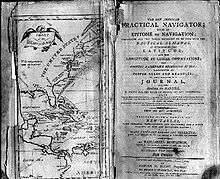Dougal Robertson
Dougal Robertson (1924–1991) was a Scottish author and sailor who with his family survived being adrift at sea after their schooner was holed by killer whales in 1972.
Early life
Robertson was born in Edinburgh in 1924. He joined the British Merchant Navy after attending Leith Nautical College. After leaving maritime life, Robertson began to raise a family and to work as a dairy farmer.
Voyage
On 27 January 1971, Dougal departed from Falmouth, England on board the Lucette, a 43-foot wooden schooner built in 1922 which the family had purchased in Malta with their life's savings. He was accompanied by his wife Lyn, daughter Anne, son Douglas, and twin sons Neil and Sandy. Over the next year and a half, they sailed across the Atlantic, stopping at various ports of call in the Caribbean. Anne retired from the voyage in the Bahamas.
During their transit of the Panama Canal, the family members took aboard an inexperienced crew member named Robin Williams, who was to accompany them on the next segment of their voyage to the Galapagos Islands and beyond to the islands of the South Pacific.
On 15 June 1972, Lucette (Lucy) was holed by a pod of killer whales and sank approximately 200 miles west of the Galapagos Islands. The group of six people on board escaped to an inflatable life raft and a solid-hull dinghy with little in the way of tools or provisions.
Using the dinghy as a towboat powered by a jury-rigged sail, the group made its way towards the doldrums, hoping to find rain there so they could collect drinking water. They did so successfully, while catching turtles, dorado, and flying fish to eat. The inflatable raft became unusable after 16 days, so the six people crowded into the three-metre long dinghy with their supplies. They then continued to use the wind and current to their advantage, moving to the northeast towards Central America.
By their 38th day as castaways, they had stored dried meat and fresh water in such quantities that they intended to begin rowing that night to speed their progress. However, they were sighted and picked up that day by the Japanese fishing trawler Tokamaru II[1] on her way to the Panama Canal. Robertson, who had been keeping a journal in case they were rescued, recounted the ordeal in the 1973 book Survive the Savage Sea, which served as the foundation for the 1991 film of the same name.
The story was revisited in his son Douglas's book The Last Voyage of the Lucette.
Death
Dougal went on to write Sea Survival: A Manual, and continued to sail until his death from cancer in 1991.
See also
- Steven Callahan, survived 76 days adrift in the Atlantic Ocean
- Maurice and Maralyn Bailey, survived 117 days adrift in the Pacific Ocean.
- Rose Noelle, trimaran on which four people survived 119 days adrift in the South Pacific.
- Poon Lim, who survived for 133 days adrift in the Atlantic.
References
- Robertson, Dougal (1973), Survive the Savage Sea
- Robertson, Dougal (1975), Sea Survival: A Manual
- Robertson, Douglas (2005), The Last Voyage of the Lucette, Woodbridge, Suffolk: Seafarer Books, ISBN 1-57409-206-5
- Brinnin, John Malcolm; Probst, Robert E; Anderson, Robert; Legett, John; Irvin, Judith L (2000), from "Survive the Savage Sea", Elements of Literature, First Course, United States of America: Holt, Rinehart and Winston, p. 456, ISBN 0-03-052058-4
- ↑ Survive the Savage Sea, p. 171, at Google Books, by Dougal Robertson
